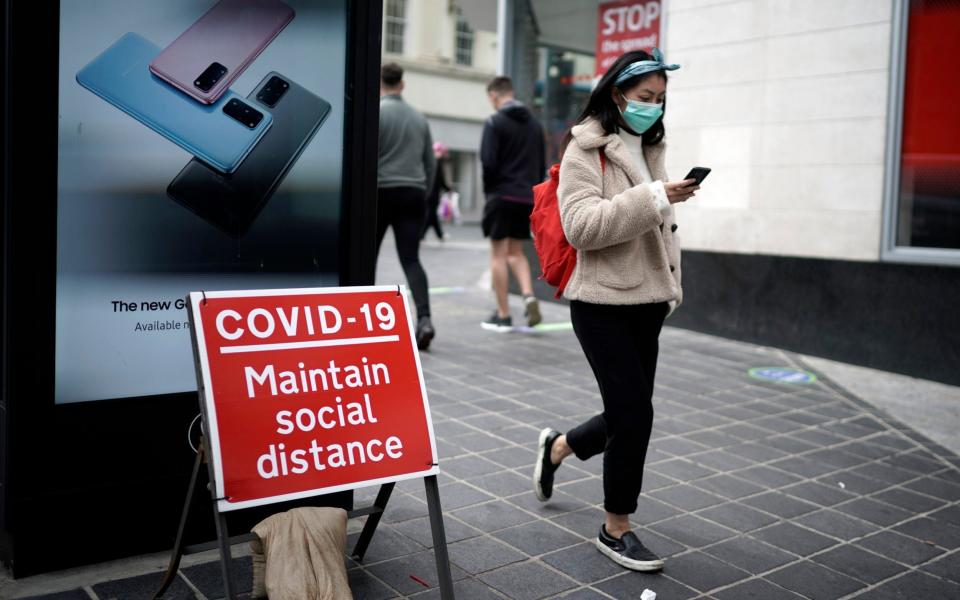Economy rebounds as retail sales surge to pre-pandemic levels

Retail sales surged back to pre-pandemic levels as shoppers barrelled out of lockdown in June, amid signs of a return to rapid manufacturing and services growth this month.
Sales volumes jumped by 13.9pc compared with May, the Office for National Statistics (ONS) said, raising hopes of a speedy "V-shaped" recovery.
Meanwhile, a closely watched survey by data firm IHS Markit shows that private sector businesses enjoyed their fastest growth for five years in July.
Retail sales volumes at non-food stores jumped by almost half in June, the ONS found, partly fdriven by a flood of customers at non-essential shops when they were allowed to open from the middle of the month.
Menawhile, fuel sales picked up by more than a fifth as drivers once again took to the road. However, both of these categories are still down on pre-pandemic sales levels.
Grocers and online shops performed better still, with food sales up 5.3pc from pre-coronavirus levels as spending switched from cafes, pubs and restaurants to supermarkets. Non-store retail is up by more than half, with the internet filling a hole left by the closure of bricks and mortar shops.
Total retail sales were 1.3pc lower than last June, a recovery from April’s year-on-year fall of 22.7pc. Excluding fuel sales, they were up 1.7pc on the year.
Ruth Gregory, of Capital Economics, said: "This is all the more impressive given that in the UK non-essential retail stores had only been open for two of the four weeks of the survey in June," said .
Not all shops have fared equally, however, with online retail now accounting for a record £3 in every £10 spent. Demand for clothing remains lower than before the crisis hit, and non-food sales across the high street are still off by a third.
Jonathan Athow, of the ONS, said: “Retail continued to recover from the sharp falls seen in April, with overall sales now almost back to pre-pandemic levels. But there are some dramatic differences in sales across the retail industry."
Economists said the shift online could become permanent after conmsumers were forced to adopt the internet at the height of the crisis. It could be a particular game changer for groceries, long a holdout against the digital revolution.
Richard Lim, of Retail Economics, said: “A sizeable proportion of consumers are shopping for products online which they had previously only ever purchased in-store.
"Many are breaking through the initial barriers of setting up online accounts, entering payment details and overcoming issues of trust. It’s inevitable that these behaviours will become permanent for some, leading to a step-change in the proportion of online shopping."
The bounce does not mean Britain has fully recovered from Covid-19.
Retail sales only account for a third of consumer spending, Samuel Tombs at Pantheon Macroeconomics said. Money spent on shopping may have been diverted from services such as hairdressers or restaurants, which were closed until July - potentially making the bounce short-lived as this cash flows elsewhere now.
The pickup could also reflect a temporary splurge after three months of lockdown instead of a long-term return to normality. Spending could also be hit by a huge wave of job losses in coming months as debt-laden firms fight to survive.
Mr Tombs said: "Real-time data suggest that this pent-up demand already has been satiate.
"Households likely will continue to devote a larger fraction of their overall spending to purchasing goods in the second half of this year, due to the greater risk of catching Covid-19 when consuming most services.
"Nonetheless, households’ incomes will not recover to pre-virus levels."
Business activity across the services and manufacturing industries also rebounded in July, IHS Markit's purchasing managers' index showed.
The survey, which shows changes in private sector activity month by month, climbed to 57.1 - its highest level since 2015. It is above 50 for the first time since February, indicating growth has returned
Expectations for future output jumped to a six-year high among manufacturers, although rising optimism in the services industry is still tempered by concerns over social distancing.
The PMI score for employment remains at 38.9, well below the 50 mark and indicating that businesses continue to cut back workers despite the return of growth.
Chris Williamson, of IHS Markit, said: "The surge in business activity in July will fuel expectations that the economy will return to growth in the third quarter after having suffered the sharpest contraction in modern history during the second quarter.
"However, while the recession looks to have been brief, the scars are likely to be deep. Even with the July rebound there’s a long way to go before the output lost to the pandemic is regained and, while businesses grew more optimistic about the year ahead, a V-shaped recovery is by no means assured."
Businesses still have some way to go to fill in the hole left by record falls in output during the lockdown after the biggest crash in economic output for centuries.
Goldman Sachs economists estimate the economy is now 8.5pc smaller than it was before the pandemic - a very rapid recovery from the peak fall of 25pc at the height of the lockdown, but still a much bigger blow than at the height of the financial crisis.
More than half a million businesses are now in significant financial distress, according to insolvency practitioners Begbies Traynor.
That is an increase of 9pc on the year with all sectors recording a rise. The real estate industry is particularly struggling as the number of significantly distressed firms jumped by almost a fifth.

 Yahoo News
Yahoo News 